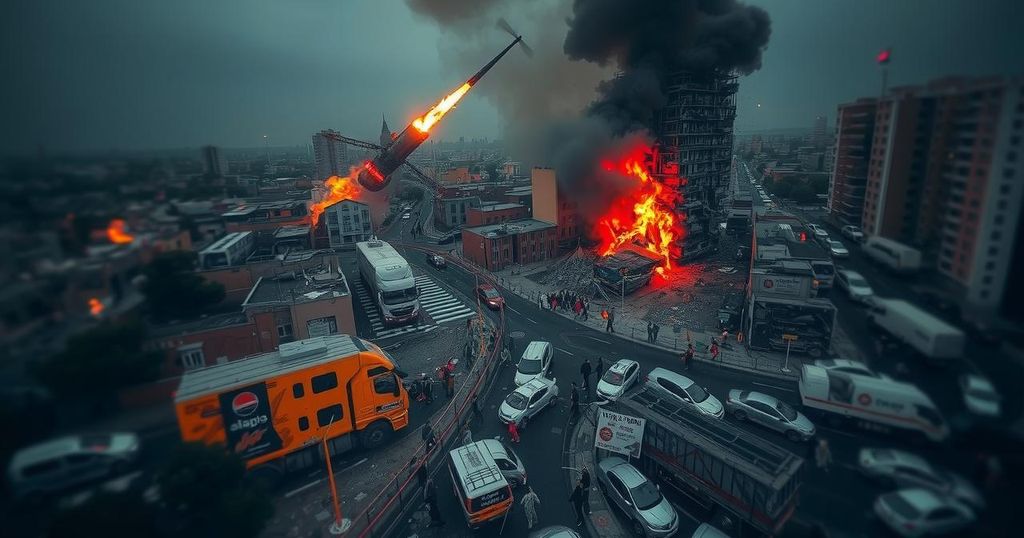Israeli airstrikes in northern Gaza have killed at least 22 people, mainly women and children, in an ongoing military offensive. Concurrently, a truck ramming incident near Tel Aviv injured 35 individuals. Meanwhile, Israel retaliated against Iranian military targets following missile attacks from Iran. The worsening humanitarian crisis in Gaza raises concerns over the civilian impact of military actions, while fears of a wider regional conflict continue to mount.
Israeli airstrikes on northern Gaza have reportedly resulted in the deaths of at least 22 individuals, predominantly women and children, as affirmed by Palestinian officials. This escalation occurs as the Israeli military offensive in the already devastated northern region approaches its third week, provoking widespread condemnation and characterization of a humanitarian disaster by aid organizations. In a related incident, a truck deliberately rammed into a bus stop near Tel Aviv, injuring 35 people. Authorities are investigating the circumstances surrounding this attack, which has been categorized as a vehicle-ramming incident, a tactic previously employed in numerous attacks by Palestinians. Recent developments indicate that Israeli forces targeted Iranian military sites in retaliatory measures following an attack involving ballistic missiles launched from Iran earlier in the month. The situation is further complicated as tensions rise between Iran and Israel, potentially steering the region towards broader conflict. The Israeli military claims the airstrikes were aimed at militant positions in Beit Lahiya; however, local reports indicate significant civilian casualties, including women and children. The humanitarian crisis in northern Gaza continues to worsen, with severe restrictions on aid and medical supplies contributing to dire living conditions for the population. The International Committee of the Red Cross condemned the situation, highlighting the plight of civilians who remain trapped amidst ongoing hostilities. Despite Israel’s assertion that its military actions are focused on combating Hamas, there are increasing calls for a reassessment of tactics deployed in densely populated areas, where civilian impacts are significant. As the conflict persists, the toll on the civilian population mounts, exacerbating an already severe humanitarian crisis. Experts warn that the ongoing violence could ignite an all-out war involving multiple regional actors, posing further threats to stability in the Middle East. In summary, the current hostilities in Gaza and escalating tensions with Iran represent a complex and dangerous landscape, demanding urgent international attention and response.
This report contextualizes the ongoing conflict between Israel and Hamas, which intensified following a surprise attack by Hamas on October 7, 2023. The subsequent Israeli military response has involved extensive air and ground operations in the Gaza Strip, leading to widespread destruction and loss of life. The conflict has had severe humanitarian ramifications, particularly in northern Gaza, where civilian casualties are on the rise amid the offensive. Reports from aid organizations indicate a dire humanitarian crisis due to restricted access to food, medical supplies, and safe shelter. Moreover, the regional implications of Israel’s attacks on Iranian military facilities highlight an escalation that could potentially draw in more countries, raising concerns over a broader regional conflict involving key players such as Iran, Hezbollah, and Hamas. This complex situation showcases the intricate interplay of military, humanitarian, and political factors at play in the region.
The situation in Gaza has reached a critical juncture, with significant loss of life and dire humanitarian conditions exacerbated by ongoing military operations. As Israel continues its offensive, which it asserts is targeted at militants, the civilian toll remains heavily scrutinized. The recent attack near Tel Aviv also reflects the escalating tensions within Israel and the broader region. With threats of a potentially wider conflict looming over the Middle East, it is imperative for international stakeholders to intervene and seek pathways toward de-escalation and humanitarian relief for affected populations.
Original Source: apnews.com







